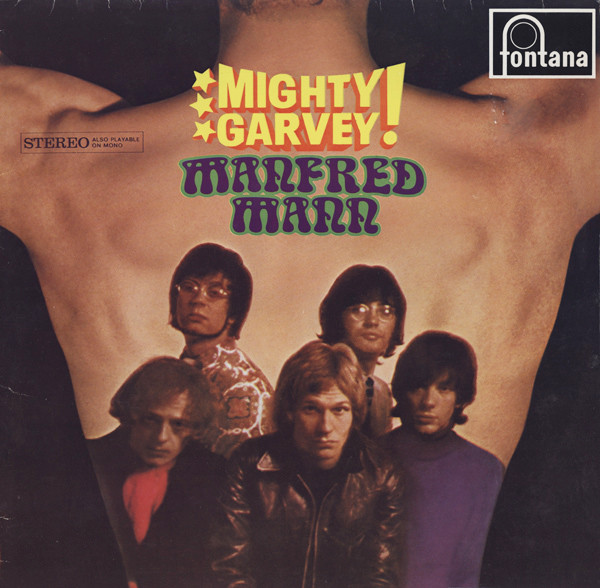Manfred Mann

Mighty Garvey - Fontana 1968 Comments:This was the third and final album by from the chapter two version of the Manfred Mann group - featuring lead-singer Mike dÁbo. The group is mostly known for their big and fine hit-singles during 1966-69 such as "Just Like a Woman", "Seme-detached Suburban Mr James", "Fox on the Run and of course the two included on this album "Mighty Quinn" and "Ha, Ha, Said the Clown"
Though band-members Mike Hugg and Mike dÁbo were brilliant song-writers themselves their singles were, by one exception, always written by other songwriters ( Bob Dylan for one ). Their three albums are all fine examples of early British pop-rock at its finest and really worth seeking out. All band-members were experinced, talented and capeable of playing very different instruments and musical styles. This obviously shows on their albums and there is a great variety in instrumentation on their albums.
"Mighty Garvey" is probably their most consistent with fine original material from Hugg and dĀbo, and apart from the "comedy" tracks "Happy Families" they stay away from their tendency to put in a couply of jazz-tunes. Though "Happy Families" hardly are meant to be taken seriously, the opener sets a fine free-and-easy mood for the album.
Mike dābo's "No Better, No Worse" is a great Traffic inspired (?) tune featuring Klaus Voorman's flute, which is also known from more of their hits. "Every Day Another Hair Turns Grey" is Mike Hugg's sad melodic answer to Beatles' "Penny Lane" - fine lead and harmony vocals on this one.
"Country Dancing" is a song much in the same vein as the single "Ha, Ha, Said the Clown", though not as good - written by dĀbo. "It's So Easy Falling in Love" and "Each and Every Day" are other fine typical Manfred Mann songs; featuring the mellotrone which also often was used on their records. Written by Hugg.
"Mighty Quinn" is simply one the greatest singles released in the late 1960's - try compare with Bob Dylan's original, then you'll understand how big this band really was.
The funky "Big Betty" is my least favourite on the album - may give associations towards Steve Winwoods Spencer Davis days.
Mike dābo's "The Vicar's Daughter" is a beautiful song, with lyrics that some may find somewhat too sentimental; for me personally it's a favourite. Guitarist Tom McGuinnes also contributed a song now and then; here he is featured with the surrelistic and experimental "Cubist Town" - though different the song works fine in the context.
Hugg's "Harry the One Man Band" is a little more of the same - art pop-rock - naive in the same way as Syd Barrett's early Pink Floyd songs. For any fan of British pop-rock of the 1960's this album is a must!
|